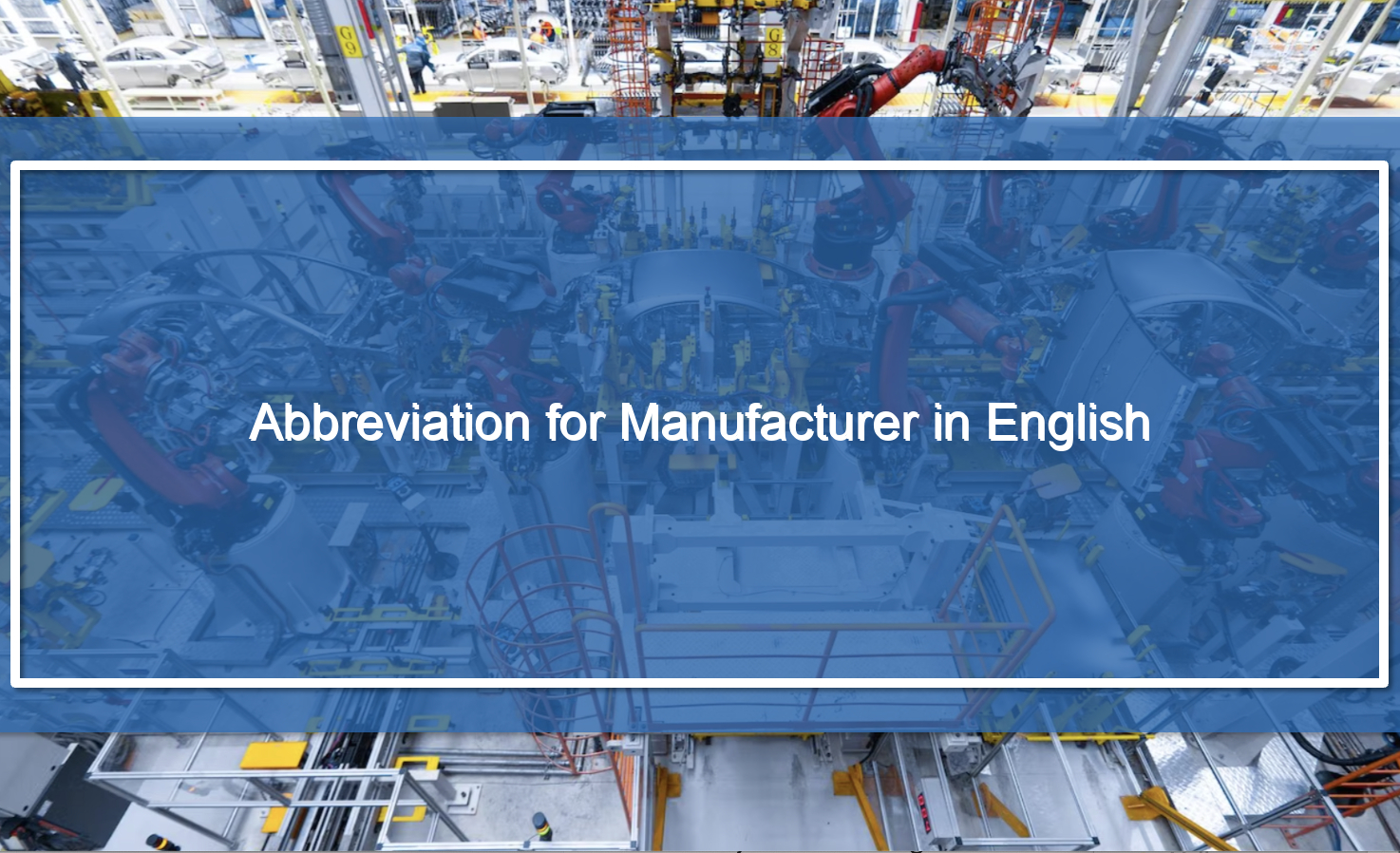Abbreviations are crucial in simplifying communication and saving time. Abbreviations are shortened forms of words or phrases, often consisting of the initial letters or a combination of letters from the original term. In the context of manufacturers, abbreviations are commonly used in various industries, including automotive, electronics, and pharmaceuticals, to refer to specific companies or products. It’s hard to keep track of all the acronyms and shorthand phrases. We use these shortened versions from LOL to OMG to save time and effort. But have you ever wondered what those seemingly random letters stand for? Well, get ready to add another abbreviation to your ever-expanding list: MFR – short for manufacturer. That’s right; the entity responsible for producing the countless products surrounding us has its handy acronym. So, let’s dive into the fascinating world of abbreviations and explore why MFR is a term you should know!
Why Use Abbreviations for Manufacturers?
Contents
The use of abbreviations for manufacturers offers several benefits:
- Efficiency: Abbreviations allow quicker and more efficient communication, especially in written form. They help save time and effort by condensing long and complex manufacturer names into shorter forms.
- Clarity: Abbreviations clarify and avoid confusion, especially when dealing with similar-sounding or similarly-named manufacturers. They help differentiate between different companies or products with similar names.
- Standardization: Abbreviations contribute to industry standardization, making it easier for professionals to communicate and collaborate across different organizations and regions.
Common Abbreviations for Manufacturers
Let’s explore some of the most commonly used abbreviations for manufacturers in various industries:
Automotive Industry
In the automotive industry, abbreviations are widely used to refer to manufacturers, specific car models, and components. Here are a few examples:
- GM: General Motors
- FCA: Fiat Chrysler Automobiles
- BMW: Bayerische Motoren Werke (Bavarian Motor Works)
- Toyota: Toyota Motor Corporation
- VW: Volkswagen
- ABS: Anti-lock Braking System
- AC: Air Conditioning
- GPS: Global Positioning System
Electronics Industry
In the electronics industry, abbreviations are commonly used to refer to manufacturers, electronic components, and devices. Here are a few examples:
- Samsung: Samsung Electronics
- LG: LG Electronics
- HP: Hewlett-Packard
- LED: Light Emitting Diode
- RAM: Random Access Memory
- HDMI: High-Definition Multimedia Interface
- USB: Universal Serial Bus
Pharmaceutical Industry
In the pharmaceutical industry, abbreviations are commonly used to refer to manufacturers, drugs, and medical terms. Here are a few examples:
- Pfizer: Pfizer Inc.
- Novartis: Novartis International AG
- Roche: F. Hoffmann-La Roche Ltd
- OTC: Over-the-Counter
- API: Active Pharmaceutical Ingredient
- FDA: Food and Drug Administration
- WHO: World Health Organization
Case Study: Abbreviations in the Automotive Industry
To further understand the significance of abbreviations in the automotive industry, let’s consider a case study:
Case Study: BMW
BMW, short for Bayerische Motoren Werke, is a renowned German automobile manufacturer. The abbreviation “BMW” has become widely recognized and is used globally to refer to the company and its products. This abbreviation simplifies communication and quickly identifies BMW vehicles and related components.
For example, industry professionals and enthusiasts often use the abbreviation “BMW” instead of the full name when discussing BMW cars. This convenient abbreviation helps avoid confusion with other manufacturers or companies with similar names.
Conclusion
Abbreviations for manufacturers play a vital role in various industries, including automotive, electronics, and pharmaceuticals. They offer efficiency, clarity, and standardization, making communication more effective and streamlined. By condensing long and complex names into shorter forms, abbreviations save time and effort while ensuring clear identification of manufacturers and their products. Whether it’s referring to General Motors as “GM” or Bayerische Motoren Werke as “BMW,” these abbreviations have become an integral part of industry-specific language and facilitate effective communication.
Q&A
Q: Are abbreviations for manufacturers universally recognized?
A: While many abbreviations are widely recognized within specific industries, it’s important to note that not all abbreviations are universally understood. Some abbreviations may be specific to certain regions or organizations. I want to ensure the intended audience is familiar with the acronym used to provide everything is clear.
Q: How can I learn the abbreviations used in a particular industry?
A: To learn the abbreviations used in a specific industry, it’s helpful to refer to industry-specific publications, websites, or glossaries. These resources often provide comprehensive lists of commonly used abbreviations. Additionally, networking with professionals in the industry and engaging in industry-related discussions can also help familiarize oneself with the abbreviations used.
What is the abbreviation for the manufacturer’s certificate?
Some countless abbreviations and acronyms can seem daunting to decipher. One such abbreviation frequently pops up is MCO, which stands for Manufacturer’s Certificate of Origin. This document plays a vital role in manufacturing as it proves that a specific manufacturer has made a particular product.
The Manufacturer’s Certificate of Origin is typically issued by the manufacturer or their authorized representative, certifying essential details about the product, such as its origin, specifications, and compliance with applicable regulations. This certificate is often required when importing or exporting goods internationally, as it provides crucial information about who manufactured the product and where it came from.
Obtaining a Manufacturer’s Certificate of Origin involves various steps, including submitting necessary documentation and completing any additional requirements imposed by regulatory bodies. As this document holds significant weight within international trade, manufacturers must ensure its accuracy and legitimacy to avoid any disputes or legal issues down the line.
So next time you come across the abbreviation MCO about manufacturing, remember that it refers to the Manufacturer’s Certificate of Origin. This critical document helps establish trust in the products being traded globally. Understanding these abbreviations can help demystify aspects of this complex industry and clarify what goes on behind the scenes.
